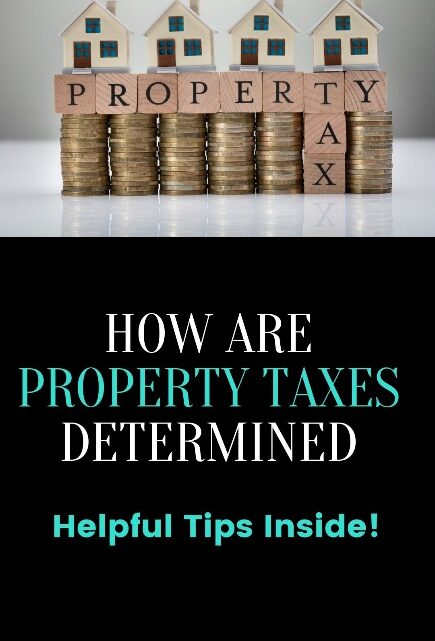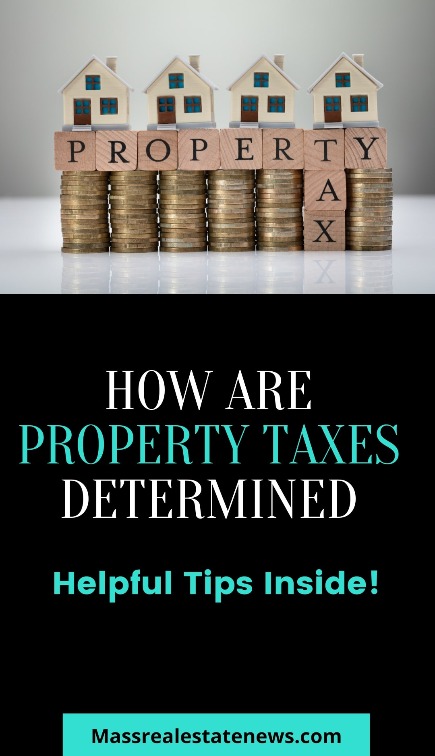In Massachusetts, cities and towns determine property taxes locally based on their municipal expenses. The tax rates may vary depending on these expenses, with potential increases or decreases. Tax assessors, whether elected or appointed, ensure the fair allocation of taxes to each individual and property within the community.
Property taxes are critical in financing public services like education, transportation, libraries, parks, and emergency services. Calculations are based on multiplying the tax or mill rate with the assessed property value, determined through cost, market, and income approaches.
Assessments are conducted yearly, and tax bills are issued quarterly. In my experience as a Realtor in Massachusetts, few people understand how real estate property taxes are determined. We will end the mystery for you and break it down in detail.
Overview of Property Taxes in Massachusetts
Property taxes are vital in financing public services and infrastructure in Massachusetts. Understanding how property taxes are determined is essential for homeowners to manage their expenses effectively.
We will explore the basics of property taxes, their significance in Massachusetts, and how they are established.
What are property taxes?
Property taxes are fees imposed on real estate owners by local communities. As mentioned, these taxes fund essential public services such as education, transportation, and emergency and recreational facilities. They are calculated based on the assessed value of the property and the tax rate set by the local government.
Importance of property taxes
Property taxes serve as a crucial source of revenue for cities and towns in Massachusetts. They enable local governments to maintain infrastructure and support community development initiatives. The funds generated from property taxes contribute significantly to the overall well-being and livability of Massachusetts communities.
How property taxes are determined
Property taxes in Massachusetts are determined locally by individual cities and towns. The tax rates vary based on the municipal budget and the community’s needs. When municipal expenses decrease, property taxes are likely to drop as well, whereas an increase in costs may result in higher property tax rates.
Property values are assessed by elected or appointed assessors, who ensure a fair allocation of taxes among the residents and properties within the community. Property values are determined using three approaches: the cost approach, which considers the replacement cost of the property; the income approach, which analyzes potential rental income; and the market approach, which compares the property with similar homes in the area.
The individual assessor decides on the valuation method and determines the fair cash value—the price a willing buyer would pay a willing seller for the property.
Assessments are conducted annually, and property tax bills are issued quarterly. It is important to note that any significant improvements or changes made to the property after the assessment date can affect the assessed value and, in turn, the subsequent property tax calculations.
Understanding the Assessment Process
The assessment process plays a crucial role in determining property taxes in Massachusetts. Here, we will explore the critical aspects of assessing property values, including the role of assessors, various valuation approaches, and factors that impact estimated value.
Role of Assessors in Determining Property Value
Whether elected or appointed, assessors play a vital role in determining the value of properties in Massachusetts. Their responsibility is to ensure a fair and accurate assessment of property values for taxation purposes.
Assessors gather relevant data, conduct property inspections, analyze market trends, and consider other factors to determine each property’s assessed value.
Three Approaches to Property Valuation
Assessors use three main approaches to determining a property’s value: the cost approach, the market approach, and the income approach.
- Cost Approach: This approach considers the cost of replacing the property. It considers construction costs, depreciation, and land value to estimate the property’s value.
- Market Approach: The market approach involves comparing the property with similar properties in the surrounding area that have recently been sold. Assessors determine the property’s value based on current market conditions by analyzing sales data and considering adjustments for differences.
- Income Approach: The income approach is primarily used for income-generating properties such as commercial buildings or rental properties. Assessors assess the property’s value based on its potential income through rent, considering factors like occupancy rates and operating expenses.
Factors that Impact Assessed Value
Several factors influence the assessed value of a property in Massachusetts. These factors include property size, location, condition, improvements, and any income the property generates. Assessors carefully consider these factors to arrive at a fair and accurate assessed value.
It should be noted that assessed and appraised values have nothing to do with one another. The property valuations you find online don’t have anything to do with assessment values.
Calculation of Property Taxes
Calculating property taxes in Massachusetts involves understanding the tax rate, calculating property tax bills, and examining examples of property tax calculations.
Understanding the Tax Rate
The tax rate is a crucial factor in determining property taxes. It is typically expressed as a rate per $1,000 assessed property value. Local governing bodies, such as municipalities or city councils, set the tax rate during budgetary meetings. The rate is influenced by the community’s financial needs, including funding for schools, infrastructure, and public services.
Calculating Property Tax Bills
The tax rate is multiplied by the property’s assessed value to calculate tax bills. The assessed value is determined by local assessors using various approaches, including cost, market, and income methods. These methods consider replacement cost, comparable properties, and potential rental income.
The assessed value may also be adjusted based on property improvements or changes. Property owners can find their estimated value on the tax assessment notices issued annually by their local municipalities.
Examples of Property Tax Calculations
Let’s consider two examples to understand property tax calculations better:
Example 1:
- The assessed value of the property: $500,000
- Tax rate: $15 per $1,000 of assessed value
- Calculation: $500,000 / 1,000 = 500 (units)
500 units * $15 (tax rate) = $7,500 (property tax bill)
Example 2:
- The assessed value of the property: $1,200,000
- Tax rate: $12 per $1,000 of assessed value
- Calculation: $1,200,000 / 1,000 = 1,200 (units)
1,200 units * $12 (tax rate) = $14,400 (property tax bill)
These examples illustrate how the assessed value and tax rate directly impact the property tax bill. Homeowners need to review their estimated value and understand the tax rate in their locality to anticipate and manage their property tax obligations effectively.
Factors Influencing Property Tax Rates
The property tax rates in Massachusetts are influenced by several key factors that affect the financial structure of local municipalities. Understanding these factors can provide valuable insights into how property taxes are determined and how they may vary across cities and towns.
Impact of municipal budgets on tax rates
Massachusetts’s tax rates are directly affected by municipal budgets. When municipalities increase their allocations to meet the growing demands for public services and infrastructure development, property tax rates tend to rise accordingly.
Conversely, property tax rates may decrease if local governments reduce their expenditures or find ways to operate more efficiently.
Relationship between property values and tax rates
The assessed value of properties plays a significant role in determining tax rates. In Massachusetts, a property’s taxable value is calculated based on its current market value or assessed value. Higher property values generally result in higher tax rates, contributing to a larger pool of taxable assets within a municipality.
Effect of local services on tax rates
Municipalities’ level and quality of local services also impact property tax rates. Towns and cities offering a wide range of services, such as education, transportation, public safety, and recreational facilities, often require higher tax rates to fund these services adequately.
Conversely, municipalities with fewer services or reliant on state funding may have lower property tax rates.
Understanding these factors can help homeowners in Massachusetts understand why property tax rates vary across different cities and towns. Considering these factors when evaluating property tax liabilities and planning for financial obligations is essential.
Tips for Managing Property Taxes
Understanding property tax exemptions and reductions
As a homeowner in Massachusetts, you must know the various property tax exemptions and deductions available. These can help reduce your tax burden and provide financial relief. Some common exemptions include:
- Senior citizen exemptions for those above a certain age
- Veterans exemptions for those who have served in the military
- Blind or disabled exemptions for individuals with specific disabilities
Exploring options for appealing tax assessments
You can appeal the assessment if your property has been over-assessed and your tax bill is too high. Gathering evidence such as recent comparable sales, property appraisals, or any discrepancies in the assessment process is advisable.
The appeal process may vary depending on the city or town, so you must familiarize yourself with the specific procedures. Hiring a real estate appraiser to provide an appraised value can be helpful when challenging a city or town’s assigned property value.
Resources for property tax information and assistance
Several resources are available to homeowners in Massachusetts seeking information and help regarding property taxes. Here are a few key sources to consider:
- The Massachusetts Department of Revenue: Their website offers guidance on property tax laws, forms, and resources.
- Local Assessors’ Offices: Contact your city or town’s assessors’ office for specific information related to your property taxes.
- Professional Tax Consultants: Seeking advice from tax professionals specializing in property taxes can provide valuable insights and guidance tailored to your situation.
Frequently Asked Questions
How often are property taxes paid in Massachusetts?
In Massachusetts, property taxes are typically paid quarterly throughout the year. Property tax bills are issued four times yearly, allowing homeowners to spread their tax payments over time.
How do I compare property tax rates across cities and towns?
You can access the Department of Revenue’s online database to compare property tax rates across different cities and towns in Massachusetts. This database provides information on property tax rates for each municipality, allowing you to compare the rates and make informed decisions based on your specific needs and budget.
Can I deduct property taxes on my federal income tax return?
Yes, you can deduct property taxes on your federal income tax return. Homeowners in Massachusetts can claim a deduction for the amount of property taxes paid throughout the year. It is advisable to consult with a tax professional or use tax software to ensure you maximize your deductions.
Are there any tax relief programs in Massachusetts?
There can be tax relief for some seniors who can qualify. The program is called the Circuit Breaker.
What happens if I don’t pay my property taxes on time?
If you fail to pay your property taxes on time in Massachusetts, you may incur penalties and interest charges. The consequences for late or non-payment of property taxes vary depending on local regulations.
Still, they can include fines, tax liens, or even potential property loss through tax foreclosure in extreme cases. It is crucial to prioritize the timely payment of property taxes to avoid any legal or financial complications.










No Comment